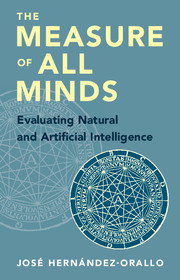Book contents
- Frontmatter
- Contents
- List of Panels
- Preface
- PART I A LONG-PONDERED OUTFIT
- PART II THE EVALUATION DISCORDANCE
- PART III THE ALGORITHMIC CONFLUENCE
- PART IV THE SOCIETY OF MINDS
- PART V THE KINGDOM OF ENDS
- 16 Universal Tests
- 17 Rooting for Ratiocentrism
- 18 Exploitation and Exploration
- References
- Index
- Plate section
18 - Exploitation and Exploration
from PART V - THE KINGDOM OF ENDS
Published online by Cambridge University Press: 19 January 2017
- Frontmatter
- Contents
- List of Panels
- Preface
- PART I A LONG-PONDERED OUTFIT
- PART II THE EVALUATION DISCORDANCE
- PART III THE ALGORITHMIC CONFLUENCE
- PART IV THE SOCIETY OF MINDS
- PART V THE KINGDOM OF ENDS
- 16 Universal Tests
- 17 Rooting for Ratiocentrism
- 18 Exploitation and Exploration
- References
- Index
- Plate section
Summary
It may someday happen … that the fields of artificial and human intelligence will grow closer together, each learning from the other.
– Douglas K. Detterman, A Challenge to Watson (2011)NO MORE NEW measurement problems need to be concocted. There are too many already out there, and many more are coming that we cannot foresee. It is now time to resolve whether the principles and techniques in this book are going to accelerate the solutions to these problems, through actual measurement tools. To raise the likelihood of a positive answer, we recount the things that the book leaves as open questions, clarify the learnt lessons and determine the priorities and dimensions of the work that is to be done. At a more general level, we also address some other questions around the several disciplines dealing with the evaluation of behavioural features: Will universal psychometrics help to bridge them? What new possibilities and applications are envisaged from a further integration?
NEW GROUNDS
The conscientious reader who has reached this point – after going through the previous chapter –may get the wrong impression that we are aiming at far-flung problems. Universal psychometrics was not motivated by speculative scenarios of a world that does not yet exist and may never do. Neither was universal psychometrics motivated by any important disfunction of human psychometrics in their traditional applications. State-of-the-art psychometric tests, if well chosen and administered, produce accurate and valid measurements on human individuals. The real instigation behind universal psychometrics was a series of measurement needs that we are already facing, most (but not all) of them originating from new kinds of cognitive entities that were not present just a few years ago.
Of course, artificial intelligence is greatly responsible for these peremptory needs, for its creating many new kinds of entities and its immaturity about their measurement. However, other needs originate from humans, computers and collectives whose abilities are modified by the use and dependency on external devices. Cognitively enhanced organisms and biologically enhanced computers, which are created by new forms of communication and integration, add to the machine kingdom.
- Type
- Chapter
- Information
- The Measure of All MindsEvaluating Natural and Artificial Intelligence, pp. 467 - 482Publisher: Cambridge University PressPrint publication year: 2017



